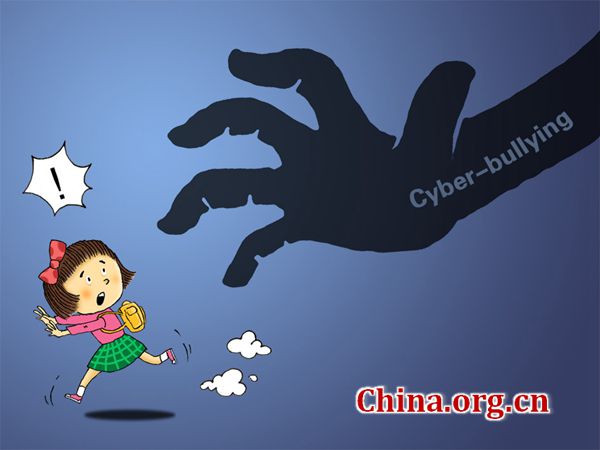Chinese network media's self-discipline in 'pornographic photo scandal'
- By Chen Hua
 0 Comment(s)
0 Comment(s) Print
Print E-mail China.org.cn, September 20, 2016
E-mail China.org.cn, September 20, 2016
|
|
|
Cyber-bullies in the shadows [By Zhai Haijun / China.org.cn] |
A large number of erotic photos of Hong Kong actor Edison Chen and his lovers were released on the internet in February 2008. Anyone uploading and disseminating these photos seriously violated public morality.
Many network media organizations on the Chinese mainland, with strengthened self-regulation, boycotted the photos, and the internet administrative departments at various levels also took concrete actions to prevent their spread.
Some BBS hosts on Sohu.com, a popular Chinese web portal, took the lead to call upon web users to boycott the photos "so as to create a healthy environment for the growth of the nation's youth."
It quickly became a social consensus that the scandal went far beyond the boundaries of the entertainment world, and actually touched on the moral bottom line. More network media outlets and netizens consciously criticized those who spread the pictures, and urged authorities to prevent them reaching juveniles.
After the Hong Kong police took action to curb the rampant spread of these photos on the internet, some web media on the Chinese mainland, however, started passing on the relay baton to disseminate the photos, harming the image of the whole media industry, as it was noted by the Hong Kong newspaper Ta Kung Pao.
These internet media outlets subsequently received administrative punishments according to relevant rules and laws for their connivance and inaction in spreading the pornographic photos.
The history of media evolution indicates that, apart from administrative and legal punishments, the industry's self-regulation and self-discipline is an important force to ensure itshealthy development, as well as the media's fulfillment of its public responsibilities.
In fact, were it not for self-regulation, the Chinese internet-related media industry would not have developed so fast. From 1994 to the end of 2007, the number of China's internet users rose from scratch to about 210 million; up to early September this year, it is more than 720 million.
In the internet era, network users are not only information recipients, but also generators and spreaders. Technology advances ensure the easy spread of information in various forms, such as audio and video. The internet also penetrates almost every layer of communication activities, whether personal, or via a system.
These changes entail new administrative models. The authorities need to rely more on the media industry's self-regulation and the participation of the users to maintain order in the new media landscape. Hu Jintao, former Chinese president and general secretary of the Communist Party of China (CPC) Central Committee, pressed the internet media to strengthen their self-regulation for the first time on Jan. 23, 2007.
The "pornographic photo scandal" in February 2008 shows the possibility of different parties' cooperation, in a bid to keep a good order in online information communication. The government, the media outlets and the internet users all have a duty in this process.
Media organization employees must have a strong self-consciousness of their due public responsibilities. Cyberspace is open and free. However, that does not constitute protection for immoral actions. All primary participants in internet communications are humans, who are subject to the restrictions of laws, rules and social conventions.
The purpose of technological advancement is to serve the people, but not the other way round. Hong Kong, as the source of these erotic photos, should also draw lessons from this scandal that self-regulation and administration of the media is necessary to prevent the public's freedom of speech from being infringed by individual evil-doers.
Edison Chen apologized to the public and admitted he took the photos that went viral. He decided to withdraw from the Hong Kong entertainment circle thereafter. The Hong Kong Press Council regretted that some Hong Kong media behaved wrongfully in the scandal, thus downgrading a noble cause to a trade in rubbish that is against public interests.
The organization also stressed it pursues freedom of speech and press, but the media outlets, as a member of social organizations, are also subject to restrictions of law and must undertake their social responsibilities.
Wen Wei Po, a Hong Kong newspaper, published an editorial, saying the scandal was related to the whole society's moral, values, privacy rights, self-discipline and social responsibilities. All parties, including the celebrities, netizens and media should reflect on their own responsibilities, so as to minimize negative influences and enhance the whole society's civilization and moral quality.
Meanwhile, the Chinese mainland media organizations' self-disciplinary actions in the scandal marked the awakening of the whole industry to the necessity and importance of building self-regulation, self-restriction and self-management in the construction of a moral and clean cyberspace environment. The incident is of practical importance to the evolution of the internet media administrative system with Chinese characteristics.
The author is an associate researcher of Beijing Internet Information office
The article was translated by Jason Lee.
Opinion articles reflect the views of their authors, not necessarily those of China.org.cn.






